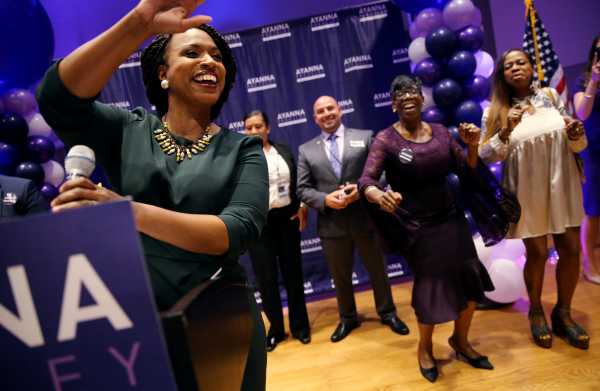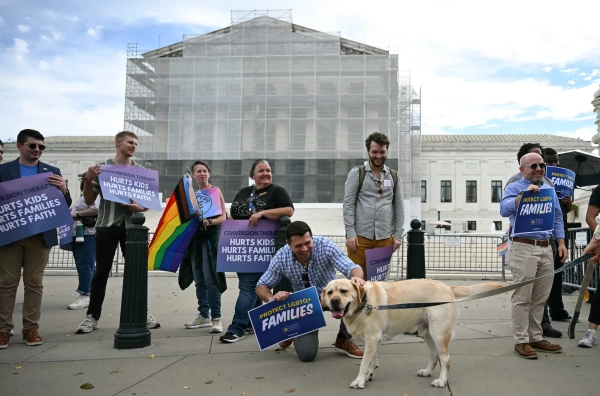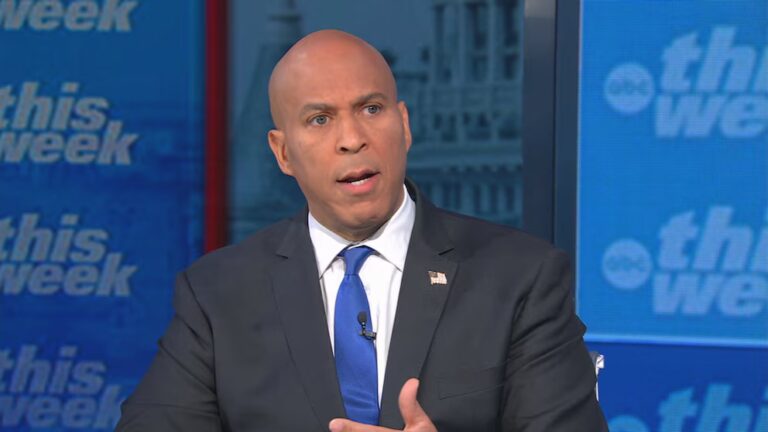
Ayanna Pressley pulled off an unexpected victory on Tuesday in the Democratic congressional primary in Massachusetts’s Seventh District, beating 10-term incumbent Rep. Michael Capuano with 59 percent of the vote. Barring a last-minute write-in campaign during the general election, Pressley will be unopposed in November and become the first black woman to represent Massachusetts in Congress.
The primary hinged less on policy differences, and more on the importance of representation and lived experience. Pressley, who was a congressional aide for years and currently serves as a member of Boston’s City Council, positioned herself as providing a political perspective that Capuano could not. She argued that it was not just her race and gender that made her a different sort of leader than Capuano, but also her experiences. Pressley has openly discussed being a sexual abuse survivor and has also spoken of being raised by her mother while her father was incarcerated.
Her background, Pressley argued, would be particularly important for the district, which has a large population of people of color and struggles with economic inequality. Pressley has stressed that representation is important to voters, often arguing that “the people closest to the pain should be closest to the power.”
Pressley spoke of this in a recent debate:
Pressley joins a number of candidates of color and women who have won races this year. But her victory also serves as a significant data point in an ongoing discussion about the need for black women, a group that has played a significant role in elections, to be better represented in seats of political power. And the successes of black female candidates suggest that voters are responding to this demand.
Black women have long been underrepresented in political office. This year suggests things might be changing.
Black women turned out in large numbers for elections in Virginia and Alabama in 2017, prompting leaders, especially on the left, to urge better engagement with black women voters as well as encourage black women to run for office. Still, that is easier said than done.
“A big barrier for a lot of black women candidates, [is] that they can’t even get out of the box, be considered a viable candidate or a serious candidate because power structures have already deemed what a viable candidate looks like, or who they should be,” Kimberly Peeler-Allen, the co-founder of Higher Heights for America, a national organization that works to get more black women involved in politics and elected to office, told me earlier this year.
At the beginning of 2018, black women held just 3.7 percent of state legislative seats, 0.96 percent of statewide elected executive positions, and just five mayorships in the US’s 100 largest cities. (They now hold six after the election of London Breed in San Francisco.) That’s according to an analysis from Higher Heights and the Center for American Women and Politics at Rutgers University. Less than 20 seats in the House of Representatives were held by black women, while a single black woman, Kamala Harris (D-CA), serves in the Senate. Collectively, black women made up just 3.6 percent of Congress.
Black political organizations and strategists have worked to change this, pouring significant resources into black candidates and launching massive voter engagement campaigns aimed at voters of color. These efforts have played a significant role in the success of candidates like Georgia’s Stacey Abrams, who could become the first black woman governor in the US if she wins the November election.
This year numerous black women succeeded in their primary campaigns. As Vox’s Ella Nilsen notes:
Some groups have argued that the victories of candidates like Pressley and Abrams are directly tied to black women’s calls for more political power.
”Black women are demanding that the progressive movement show us they respect our leadership and the power of our vote, by investing more in Black women running for office; and Black women-led organizing and institutions,” Melanie Campbell, president and CEO of the National Coalition on Black Civic Participation and the Black Women’s Roundtable, said in a statement earlier this year.
Black politicians are speaking to issues that affect all voters, but they’re also talking about racial injustice and inequality
The call is not just for more representation. It’s also, as Pressley explained, a call for a party that better responds to the issues people of color face. Polls of black voters show that they are dealing with high levels of racial anxiety this year, and that they are looking for politicians capable of speaking to issues like health care and the economy as well as racial justice. And while Trump is someone who black voters want to stand up against, they have also indicated that opposition to Trump isn’t enough to get them to the polls.
“There’s a political courage that candidates are showing that is about not simply saying that they stand against Trump, but naming what the problem is,” said Adrianne Shropshire, the executive director of BlackPAC, which has worked to engage black voters in several contests this year. She adds that “it’s about speaking about the racism, and bigotry that is a part” of what is happening in the country.
Black candidates this cycle have stressed these very things in their campaigns. Pressley, for example, said in a recent interview with Jezebel that she was focusing on “economic inequality, the wealth and wage gap, structural racism, and gun violence,” and criticized her opponent for voting for a “Blue Lives Matter” bill.
Lucy McBath first entered the national stage as a “Mother of the Movement” after her son was killed in an act of racist gun violence, and is running for Congress in Georgia’s Sixth Congressional District. She has campaigned on issues like the economy, but has also highlighted gun violence and the ways it particularly affects communities of color. Florida Democratic gubernatorial candidate Andrew Gillum has called for the suspension of the state’s controversial “Stand Your Ground” law, a measure that critics argue is too often used to justify the murders of black men while also failing to protect black women from criminal charges.
And promoting these types of issues has also come with a concerted effort to mobilize black voters, particularly black women.
It is a strategy that could lead candidates of color to success in November and future elections. And for black voters, it could create a lasting change in how they engage and are engaged with in political contests.
“It is important for all progressive and democratic candidates to take note of how [black candidates] are centering black voters and their issues, and are applying their own lived experience to talking about these issues,” Shropshire said. “Voters are looking for people who are genuine and can understand what they are going through, but are also willing to show courage in this political moment.”
Sourse: vox.com






